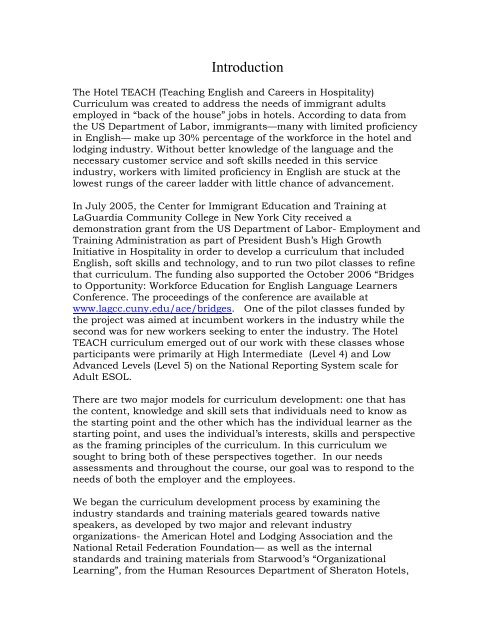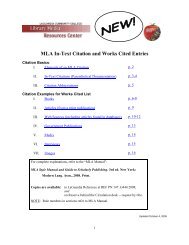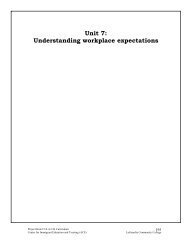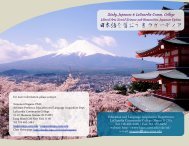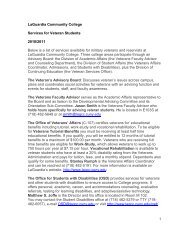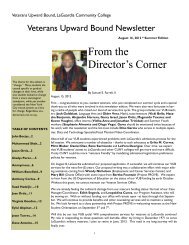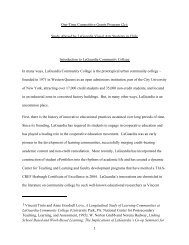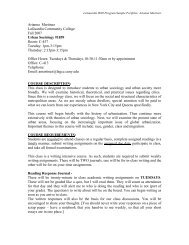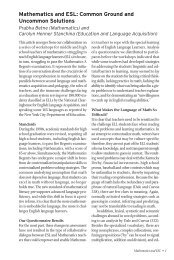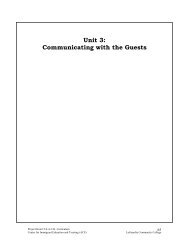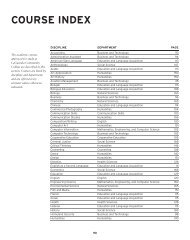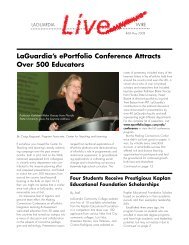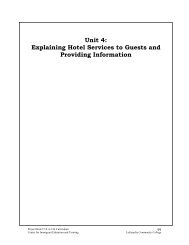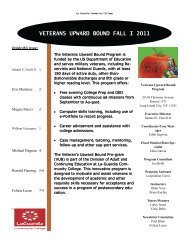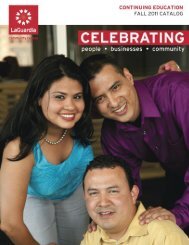Introduction - LaGuardia Community College - CUNY
Introduction - LaGuardia Community College - CUNY
Introduction - LaGuardia Community College - CUNY
You also want an ePaper? Increase the reach of your titles
YUMPU automatically turns print PDFs into web optimized ePapers that Google loves.
<strong>Introduction</strong><br />
The Hotel TEACH (Teaching English and Careers in Hospitality)<br />
Curriculum was created to address the needs of immigrant adults<br />
employed in “back of the house” jobs in hotels. According to data from<br />
the US Department of Labor, immigrants—many with limited proficiency<br />
in English— make up 30% percentage of the workforce in the hotel and<br />
lodging industry. Without better knowledge of the language and the<br />
necessary customer service and soft skills needed in this service<br />
industry, workers with limited proficiency in English are stuck at the<br />
lowest rungs of the career ladder with little chance of advancement.<br />
In July 2005, the Center for Immigrant Education and Training at<br />
<strong>LaGuardia</strong> <strong>Community</strong> <strong>College</strong> in New York City received a<br />
demonstration grant from the US Department of Labor- Employment and<br />
Training Administration as part of President Bush’s High Growth<br />
Initiative in Hospitality in order to develop a curriculum that included<br />
English, soft skills and technology, and to run two pilot classes to refine<br />
that curriculum. The funding also supported the October 2006 “Bridges<br />
to Opportunity: Workforce Education for English Language Learners<br />
Conference. The proceedings of the conference are available at<br />
www.lagcc.cuny.edu/ace/bridges. One of the pilot classes funded by<br />
the project was aimed at incumbent workers in the industry while the<br />
second was for new workers seeking to enter the industry. The Hotel<br />
TEACH curriculum emerged out of our work with these classes whose<br />
participants were primarily at High Intermediate (Level 4) and Low<br />
Advanced Levels (Level 5) on the National Reporting System scale for<br />
Adult ESOL.<br />
There are two major models for curriculum development: one that has<br />
the content, knowledge and skill sets that individuals need to know as<br />
the starting point and the other which has the individual learner as the<br />
starting point, and uses the individual’s interests, skills and perspective<br />
as the framing principles of the curriculum. In this curriculum we<br />
sought to bring both of these perspectives together. In our needs<br />
assessments and throughout the course, our goal was to respond to the<br />
needs of both the employer and the employees.<br />
We began the curriculum development process by examining the<br />
industry standards and training materials geared towards native<br />
speakers, as developed by two major and relevant industry<br />
organizations- the American Hotel and Lodging Association and the<br />
National Retail Federation Foundation— as well as the internal<br />
standards and training materials from Starwood’s “Organizational<br />
Learning”, from the Human Resources Department of Sheraton Hotels,
New York, our employer partner. Through site visits and interviews with<br />
Sheraton staff, we then sought to pull out the sub-skills, competencies<br />
and knowledge implicit in the industry standards so that they could<br />
become content to be addressed through the curriculum. These industry<br />
standards provided the parameters of the curriculum.<br />
However, as we began to work with our students, we also recognized that<br />
for the curriculum to be meaningful to them, the curriculum and the<br />
training needed to address where the students were and start from thereby<br />
identifying what they felt they needed to know and learn, and<br />
gathering resources that would help them learn successfully. The<br />
curriculum therefore reflects both of these challenges, seeking to address<br />
the industry standards and start from where the students are, build<br />
from their prior knowledge and guide them to apply that prior knowledge<br />
to the new content.<br />
One of the key goals of the Hotel TEACH Curriculum is to orient English<br />
language learners to the skills expected of workers in the lodging<br />
industry. In pre-course assessments and interviews, employers<br />
communicated the necessity to have employees not only improve their<br />
language skills but to refine the interpersonal skills essential to providing<br />
exemplary customer service. Our students helped us learn what got in<br />
the way of their providing this service. The Hotel TEACH curriculum<br />
thus reflects both the students and employers input.<br />
The framework for the content of the curriculum and its approach are<br />
the principles of Equipped for the Future content standards. The<br />
curriculum addresses aspects of each of the Broad Areas of<br />
Responsibility in the Worker Role of the EFF Standards: “Do the Work”,<br />
“Work with Others”, “Work within the Big Picture” and “Plan and Manage<br />
Professional Growth” as they are relevant to the hotel and lodging<br />
industry. The curriculum and lessons seek to implement key EFF<br />
principles such as building from what students already know, making<br />
the skills and learning explicit, helping students understand how to learn<br />
from observing, analyzing and reflecting on their own and others’ actions,<br />
and evaluating growth through the means of rubrics and checklists. This<br />
context of a set of nationally developed curriculum standards also makes<br />
it possible for the curriculum to link to other national curricula that have<br />
the same basis.<br />
We sought to teach English not just as a set of discrete phrases,<br />
vocabulary or grammar items, but as means to communicate and<br />
interact with others in a social setting. The curriculum therefore focuses<br />
not just on elements of the language, but also on behavior and how<br />
meaning is communicated through language and body language within<br />
that social setting.
Other Features of the Curriculum:<br />
The Career Counseling: Each unit of the Hotel TEACH curriculum begins<br />
with a Career Counseling lesson which leads students through a series of<br />
exercises designed to help them reflect and identify their attitudes and<br />
abilities in the content being focused on. Values, beliefs, attitudes and<br />
the behavioral manifestations of these are at the core of the “soft skills”<br />
we sought to teach because, quite early on, we recognized that our<br />
students would be able to provide high quality and professional customer<br />
service only through developing a sense of pride and dignity in their own<br />
roles as professionals providing an important service at the workplace.<br />
Learning how to be a professional is not just about acting like a<br />
professional but of seeing oneself as a professional.<br />
Soft skills like active listening and listening with empathy, along with<br />
speaking with confidence and taking initiative are certainly valuable<br />
assets to employers. But these skills also enable workers to have a sense<br />
of ownership and pride in their role and their ability to manage the<br />
challenges of that role. Since applying these skills was impeded by the<br />
fact that students did not know the appropriate ways to express them in<br />
English, the learning of the new behavioral and attitudinal skills was<br />
integrated with the learning of the language for expressing these skills<br />
appropriately.<br />
The Teaching of Transferable Skills: Learning to identify essential life<br />
skills and reposition them as work skills is another theme of the<br />
curriculum, together with providing students with opportunities to<br />
acquire new transferable skills. These skills are not always easily visible<br />
or identifiable for students and there is an awareness -building<br />
component to the lessons. Students learn the value of their everyday life<br />
skills and how to market these skills by identifying how these skills<br />
translate to the workforce. This is an additional confidence building<br />
activity as students recognize their transferable skills and learn to<br />
verbalize those skills in an interview for a workplace context. Making<br />
connections between what they have done, either in previous work or life<br />
experience, and what they aspire to do gives them the confidence that<br />
they have tangible experiences they can refer to on the job and in an<br />
interview, and helps them value their life experience.<br />
Use of Instructional Technology: Built into the curriculum is instruction<br />
in commonly used technology such as use of the email, the internet, and<br />
common Microsoft Applications (Word, Powerpoint and Excel). We also<br />
incorporated instructional technology such as a class Blackboard site,<br />
using MP3 players to download and record audio lessons and developed<br />
a podcast site on the internet to supplement training lessons. It is of
course possible to teach the core of the curriculum (the EFF standards,<br />
the Industry Skills, the Career Counseling lessons, and the English<br />
Language lessons) without incorporating technology into them. However,<br />
there are many important reasons to integrate the technology into the<br />
classroom. The ability to use information technology is an important skill<br />
in the workplace and many adults with limited proficiency in English<br />
also have limited skills and confidence in their use of these technologies.<br />
Improving their skills in these technologies gave our students more<br />
career opportunities and served to boost their confidence in their abilities<br />
to learn new skills. The Blackboard site and the podcast lessons became,<br />
for students who could not attend every class because of work or life<br />
commitments, a major means to stay abreast of what was happening in<br />
class and to continue their learning outside of class. That flexibility was<br />
important in working with a class of employed individuals. It was our<br />
experience that even students who attended the class regularly would<br />
find the time to go on the Blackboard site to do additional work in<br />
between classes.<br />
This curriculum represents between 160-190 hours of classroom<br />
instruction. However, as any classroom teacher knows, the actual time<br />
and resources that a particular class needs varies. We used a range of<br />
supplementary instructional materials, both those existing in the market<br />
and new ones that we developed expressly for the course. We feel that<br />
the best way to use this curriculum is as a core set of lessons to be<br />
supplemented, modified and enhanced through materials and topics<br />
relevant to each new class of students and would urge all teachers to do<br />
so. That way, the curriculum and the instruction remain grounded in the<br />
lives and realities of the students.<br />
The Hotel TEACH Curriculum Writing Team<br />
Center for Immigrant Education & Training, Adult and Continuing Education<br />
<strong>LaGuardia</strong> <strong>Community</strong> <strong>College</strong>, <strong>CUNY</strong><br />
June 2007
Acknowledgements<br />
The Hotel TEACH Curriculum would not have been possible without the<br />
contributions of many people. We would especially like to express our<br />
gratitude to:<br />
• The U.S. Department of Labor, Employment and Training<br />
Administration for having made this program possible through their<br />
funding support.<br />
• President Gail O. Mellow of <strong>LaGuardia</strong> <strong>Community</strong> <strong>College</strong>, Vice<br />
President Jane Schulman and Dean Sandra Watson of the Division of<br />
Adult and Continuing Education for their support of this project and for<br />
the Center for Immigrant Education and Training.<br />
• Heide Spruck Wrigley for her role in helping to conceptualize this<br />
curriculum.<br />
• Our Employer Partner the Sheraton Manhattan Hotel, especially<br />
Mary Anne McNulty and Lanette McNeil of Sheraton’s Human Resource<br />
Department, for their support and insights.<br />
• The members of the Advisory Council, for their practical knowledge<br />
and ongoing assistance, including: Mary Moorhouse Director, Workforce<br />
Development, National Retail Federation; Susan Arroyo Manager of<br />
Workforce Policy, NYC Workforce Investment Board; Marilyn Shea<br />
Executive Director, NYC Workforce Investment Board; Faye Gayes<br />
Director of Workforce Development, American Hotel and Lodging<br />
Association; Judith Gazzola Director, Career Development Center,<br />
<strong>LaGuardia</strong> <strong>Community</strong> <strong>College</strong>; Timothy Ruczinski Director, Center for<br />
Corporate Education, <strong>LaGuardia</strong> <strong>Community</strong> <strong>College</strong>; Sandra Watson<br />
Dean, Adult Continuing Education, <strong>LaGuardia</strong> <strong>Community</strong> <strong>College</strong>.<br />
• The staff of the <strong>LaGuardia</strong> <strong>Community</strong> <strong>College</strong> Workforce 1 Stop<br />
Center for their efforts on behalf of the Hotel TEACH students.


